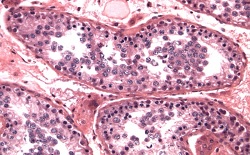 |
| A biopsy of an infertile man's testis shows the precursors of sperm, but no mature sperm.--Courtesy of UPenn |
Mutations in an X chromosome gene called TEX11 have been tapped as the likely cause of about 1% of all cases of male infertility, which could help begin to explain the origins of infertility at a time when genetic counseling is becoming increasingly popular.
An experienced team of investigators at the University of Pennsylvania made that observation 7 years after concluding that TEX11 provoked sterility in mice. To confirm a link with humans, they took genomic samples from 246 men with azoospermia, the most severe form of male infertility, and compared it with samples from a control group.
Not only did they find more variants of the TEX11 gene in the infertile arm of the study, there was a string of cases of male infertility in one family where the investigators believe that it was likely passed on by a grandmother's X chromosome. And they identified three specific mutations that were likely linked to 1% of all cases of infertility.
"If men had one of these same mutations in this gene, I think we could safely say that's the cause of their infertility," says Jeremy Wang, a professor at Penn's School of Veterinary Medicine. And that's an answer that could help explain matters as more men get their genome sequenced.
"Given that there are hundreds of candidate genes for male infertility," Wang added, "1% is actually very significant."
- here's the release